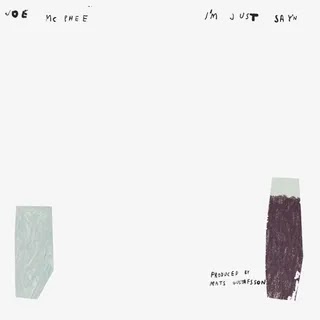Joe McPhee is not only an exceptional saxophonist and trumpeter, he has
also been a man of words, a poet. On the one hand he can be a classical
storyteller in the tradition of West African griots, musicians and
historians of sorts who have preserved the oral tradition and cultural
memory of their communities. These griots have played an important role in
festivals and everyday situations, using stories, songs and music to tell
and convey the history of their peoples. Joe McPhee, though, takes a very
free approach to this cultural heritage. Recent examples of this are his
contributions to “ECHOES: I See Your Eye Part 2” on the last Fire!
Orchestra album or the title tracks of Tell Me How Long Has Trane Been Gone
and Keep Going, his duos albums with John Edwards and Hamid Drake. On the
other hand Joe McPhee’s music is infused with an enormous awareness of
black history, which could also be seen on Musings of a Bahamian Son:
Poems and Other Words by Joe McPhee, a collection of his poems. I’m Just
Say’n now focuses on the fusion of music and poetry, backed by his longtime
collaborator Mats Gustafsson on baritone and bass sax, flutes, piano mate,
piano harp, organ, fender rhodes and live electronics.
On I’m Just Say’n three types of lyrics crystallize. There are the more
lyrical and coded pieces such as “Short Pieces”, which have seemingly
unrelated associations with all sorts of things, here with Eric Dolphy,
Peter Brötzmann, David Murray, Don Cherry or simply with silence; or
“Words”, in which McPhee compares the COVID pandemic with the AIDS crisis
of the 1980s. In this piece he throws out nouns in an acrostic, seemingly
unrelated, but only seemingly, because the listener’s associations can
create a connection. Another type are pieces with political significance,
in which McPhee criticizes social conditions. Examples of this are “They
Both Could Fly”, an allegory of a homeless woman in New York, Old Rita,
trying to keep her dignity (perhaps the most touching piece on the album)
and “BYOBB“, on which McPhee sings: “Annie had a baby, she can’t work no
more”. It’s a classic blues beginning (McPhee has always been a blues man)
and a renewed indictment of policies that leave young families alone. The
third type are personal anecdotes such as “When I grow up”, which McPhee
dedicates to a friend to whom superhero qualities are attributed. At the
same time, however, these narrative styles intermingle here and there, as
in “I’m Just Say’n”, a piece that already existed on “Musings of a Bahamian
Son”, but here it is extended and McPhee also sings, he doesn’t just
recite. The opening lines are repeated at the end and are actually
something of a motto in these dark times: “No buzzards shall pick these
bones tonight/We are not dead/We must not sleep/Rise up, fly high and
wander far”. Another example is “NYC Nostalgia Redux”. Here, too, there’s
the sung introduction. New York is displayed as a city charged with
symbolism, McPhee refers to the state of affairs in the 1970s in a mixture
of narrative, political indictment and cynicism (the past wasn’t great, they
have never existed, the good old days – and so nothing can be made great
again).
Joe McPhee concentrates entirely on the delivery of the words, musically
they are congenially accompanied by Mats Gustafsson, who puffs and steams
and pants into his saxophone, or contributes a heavily psychedelic space
organ that meanders through the lyrics. He also frequently creates wind
noises that seem to press against huge sheet metal walls. All of this is
done to perfectly support the lyrics.
I’m Just Say’n anticipates the forthcoming McPhee memoir, Straight Up,
Without Wings: The Musical Flight of Joe McPhee, written with Mike Faloon,
a book that will be published later this year by Corbett vs. Dempsey. I’m
really looking forward to this one, too.
The album is available as a download and an LP, you can buy and listen to
it here:
The LP is sold out on the band camp site, but it’s available at several
places, for example at the Downtown Music Gallery.




















